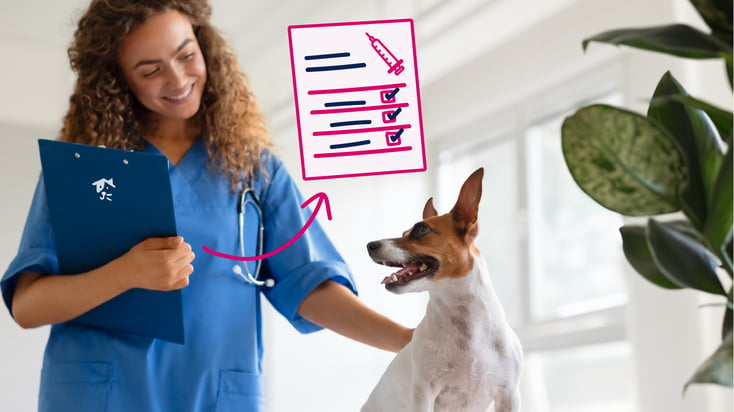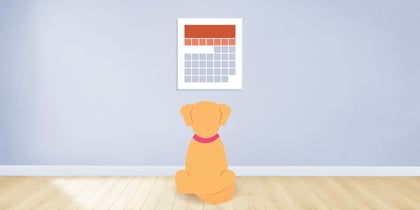5-in-1 Vaccine for Puppies Schedule: Complete Guide

Table of Contents
Bringing home your new puppy is an exciting, nerve-wracking, and above all busy time! There are so many things to consider, from feeding, worming, and training, to enrolling in puppy preschool and generally getting to know this new little addition to your family.
With all this going on, it can be easy to lose track of your puppy's vaccination schedule. However, it is probably one of the most important factors to remember.
Key Takeaways:
- The 5-in-1 vaccine, or DHPP vaccine, protects against five viruses: Canine Distemper Virus, Canine Adenovirus 1 and 2, Canine Parainfluenza, and Canine Parvovirus.
- Puppies should receive the 5-in-1 vaccine starting at 6-8 weeks of age, with shots given every 3-4 weeks until they reach 16 weeks old.
- If you have any doubts or questions about your puppy's vaccination status, consult with a veterinarian for guidance and clarification.
What Does the 5-in-1 Vaccine Cover?
The 5-in-1 vaccine, also known as the DHPP vaccine, is a crucial preventive measure for dogs. It guards against five severe diseases: Canine Distemper, Adenovirus types 1 and 2, Parainfluenza, and Parvovirus. These vaccines stimulate the immune system to defend against these illnesses, ensuring your furry friend's health.
Here's a breakdown of each how it protects your dogs against each different disease:
Canine Distemper Virus
Canine Distemper Virus is a particularly nasty virus that is spread largely through respiratory secretions but can cause gastrointestinal and neurological issues as well as pneumonia. Currently, there is no known cure for this often-fatal disease.
Canine Adenovirus (CAV) 1 and 2
CAV-1 is the infectious agent behind Canine Hepatitis, which causes severe liver disease. CAV-2 is one of the viruses associated with kennel cough, one of the most common infectious diseases our canine companions suffer from.
Canine Parainfluenza
Canine Parainfluenza is another kennel cough-causing pathogen that often results in coughing, runny noses, and high temperatures.
Canine Parvovirus
Canine Parvovirus is probably the most well-known virus the vaccine covers due to the widespread prevalence of the disease all over the world. It can affect any age of the dog, but it is often thought of as a disease in young puppies as they are most susceptible. Parvo causes vomiting, bloody diarrhea, dehydration, lethargy, and loss of appetite.
How Often Do You Give a Puppy a 5-in-1 Vaccine?
The DHPP vaccine can be given to puppies between 6 and 8 weeks of age. For optimal protection, puppies should receive a 5-in-1 shot every 3 to 4 weeks until they reach 16 weeks of age. This means that most puppies will receive 3 to 4 puppy shots within their first 4 months.
Hassle-Free Puppy & Kitten Vaccinations
No more stressing out your little one with car rides and waiting rooms. We bring wellness exams and vaccinations right to your doorstep.
Why are Multiple Shots Necessary for Puppies?
While it may seem like many shots for your puppy, there are two main reasons for this:
1. Vaccines train the body to respond to infections
Vaccines work by training the body to respond to specific infections. The first vaccine primes the body's immune system to recognize and respond to the disease, while the second shot boosts that response, providing maximum protection.
2. Maternally derived antibodies (MDA)
Like other very young animals, puppies have Maternally Derived Antibodies (MDA). These antibodies are passed from the mother to the puppy during pregnancy and lactation, providing some disease protection in the early stages of life.
However, they can also interfere with vaccine-induced immunity until around 14 to 16 weeks of age. The presence of MDAs determines when we start and finish the puppy vaccination schedule.
Determining if your puppy has received all the necessary shots at the correct intervals can be confusing, especially if they started their vaccination schedule with their breeder. If you are unsure whether your puppy is fully protected, it's recommended to consult with a veterinarian for guidance.
Conclusion
In conclusion, the 5-in-1 vaccine plays a crucial role in safeguarding your puppy's health by offering protection against various diseases. Following the recommended vaccination schedule provided by your veterinarian is vital to ensure your puppy receives optimal protection. Prioritizing vaccinations and check-ups sets the foundation for your beloved puppy's healthy and happy life.
Contact BetterVet to schedule a puppy check-up and provide the best care for your furry friend.
Frequently Asked Questions
Are there any side effects to 5-in-1 shots for puppies?
Occasionally, your puppy might be slightly subdued for a day or so after their puppy shot. It is also possible for a small lump to develop where the injection was given, which can be slightly tender to the touch. However, the majority of puppies don’t show any visible signs after vaccination.
It is important to contact your veterinarian straight away in the unlikely event of any of the following signs: difficulty breathing, all-over bumps or hives, facial swelling, or repeated vomiting or diarrhea.
Does my puppy need any other vaccinations?
The DHPP vaccine is considered a ‘core’ vaccine which means the World Small Animal Veterinary Association advises that it should be given to all dogs. Other so-called ‘lifestyle’ vaccinations should be used only as and where necessary, depending on your puppy’s individual risk. These dog vaccines include leptospirosis and kennel cough.
I think my puppy may be sick, can she still have her 5-in-1 puppy shot?
More than likely, your veterinarian will postpone your puppy’s vaccination if they are not well. There may be some more minor, superficial ailments that can be treated on the same day as a vaccination. However, when we administer any vaccination, we are asking the body’s immune system to work harder than usual for a while.
If your puppy is already feeling unwell, giving a vaccination can risk making her sicker, or risk the vaccination not working very well. If you think your puppy might be sick or are unsure if you should take her for her puppy shot, have a chat with one of our vets to help point you in the best direction for treatment.
Will my puppy need another 5-in-1 vaccine in the future?
In short, yes. Vaccine schedules for adult dogs vary between regions and depend on local risk. Traditionally, young adult dogs were given a 5-in-1 booster 9-12 months after their final puppy shot, however, there is evidence now that suggests there are benefits to giving this booster younger, at around 6 to 9 months of age.
After this adolescent booster, the 5-in-1 vaccine need only be given every 3 years. Your vet will most likely issue you with a vaccine recall reminder when their next shot is due.




